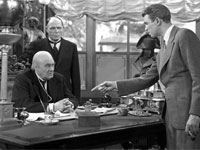
The last estimate for the amount of public money going to Northern Rock was £50bn. For that price we've bought ourselves a bankrupt bank. It isn't clear how many of the other banks are also teetering on the brink but the government is sufficiently concerned to oblige us to buy their worthless assets (euphemistically known as 'mortgage-backed securities') to the the tune of another £100bn. or so.
These numbers are nice and round. If we round the population of the UK to 50 million we can see fairly easily that we have recently spent around £3000 per head on bankrupt banks. This does not feel like a very good long-term investment that is going to serve the public interest.
Let's compare it with the post offices. Here we paid Adam Crozier £1.3m last year and bonuses to board members came to £4.5m. in total. This is a reward for closing 20 per cent of our post offices this year - 2,500 are due to close by the end of 2008. One of those is my local post office in Uplands. It is a profitable business but post office managers have closure targets to meet in order to receive their bonuses this year so it is on the list.
The cost of keeping my post office open is a mere £24,000, so if I could find eight other people and ask them whether they would rather give their £3,000 to keep the post office open or keep some degenerate banks afloat I could raise the cash in half and hour or so. Of course, although we apparently live in a democracy, we don't have that choice. Instead, we are probably going to have to put our hands in our pockets as a community here in Stroud to subsidise our post office.
At least our postmaster is resisting the hefty bribes on offer for redundancy packages. Many others, especially the old and tired, are taking the money and creeping off to retirement. As with the pit closures, they are being offered a good deal now and told they will get nothing in the future if they refuse it. Our money is being used to bribe people out of their livelihoods.
This week we saw Housing Minister Caroline Flint having to remind herself that she should put the interests of the British people first. Just like the rebranding of the Post Office as 'the people's post office' this sort of doublethink is only necessary becase it is no longer the truth. What is happening with the Post Office is symbolic of what is happening to our democracy - we are allowing it to be stolen from us by profit-driven corporate executives. And the solution is the same too: use it or lose it. If you vote for one of the parties that have prostituted themselves to corporate interests (or don't vote at all) you only have yourself to blame. Tweet





